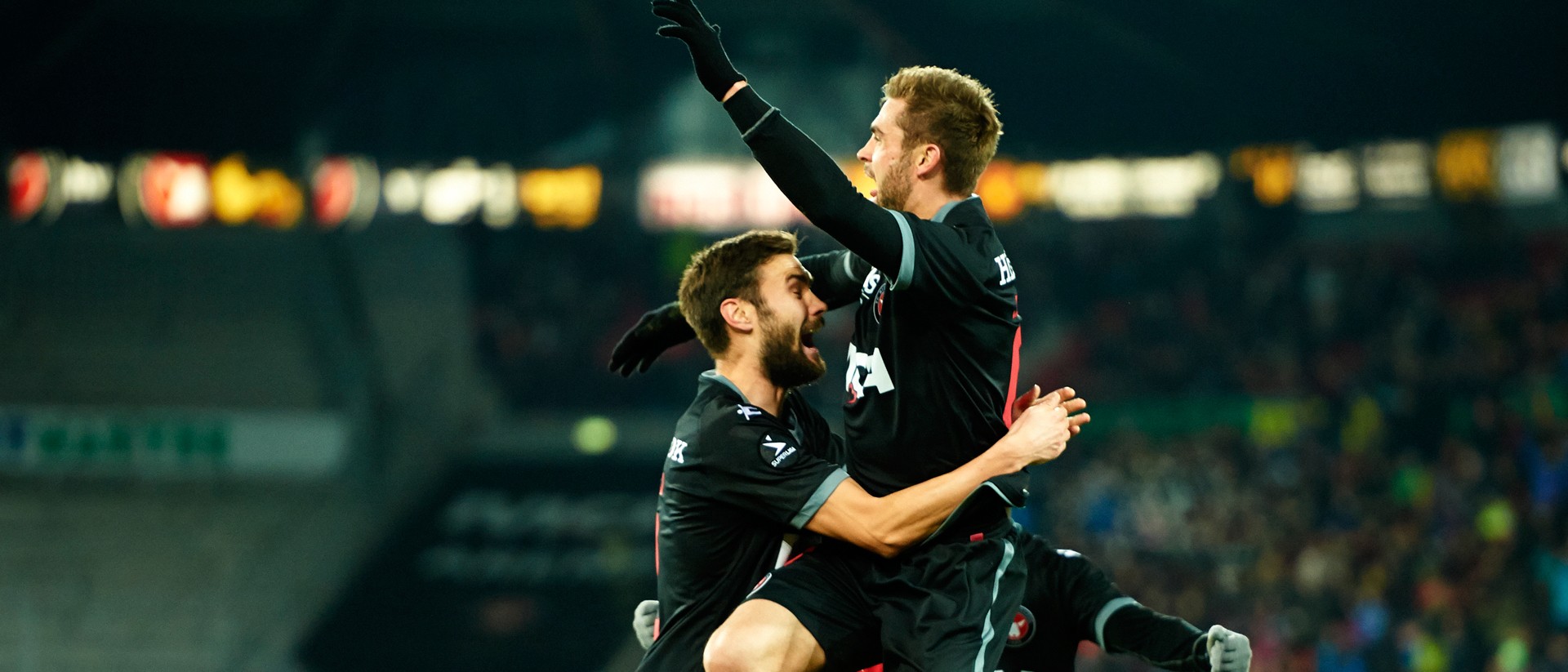It’s hard to find a more interesting club in world football right now than Denmark’s FC Midtjylland.
If you’re unconvinced, spend some time talking with Rasmus Ankersen, the club’s 32-year-old chairman. After two minutes, he’ll draw you in with his great plans for the club and his great trouble hiding his enthusiasm. After five minutes, he’ll share more interesting ideas than most football executives can muster in a lifetime. And after fifteen minutes, it’s clear that FC Midtjylland is no longer just a football club. It’s a laboratory for a radical experiment.
The experiment — as outlined by Ankersen in a breathless 80-minute interview — is to test the thesis that you can successfully run a football club based on statistical analysis of the game; that you can stamp out irrational, subjective, and emotional decision-making and replace it with the scientific method; and that, in so doing, you can give a small club a competitive edge over its bigger, richer opponents.
‘We can’t outspend our competitors,’ Ankersen says. ‘So we have to outthink them. And we think that careful analysis of data on leagues, teams, and players can give us an edge.’
The Danish data revolution
This is radical stuff in the game that the New York Times in 2010
dubbed
‘the least statistical of all major sports.’ This characterization holds true today, even when several observers have concluded that football is going through a ‘data
revolution.’
Rasmus Ankersen
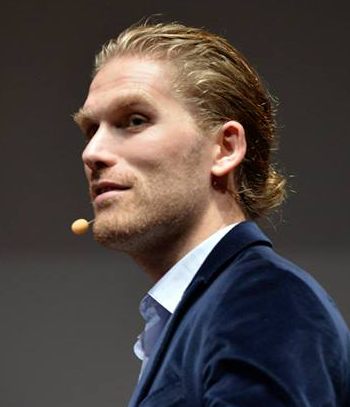
Certainly, a few forward thinking football minds are heeding the lessons of Moneyball, the book-cum-movie about the Oakland Athletics baseball team and their general manager Billy Beane, who outperformed richer opponents through the use of statistical analysis.
But until now, Ankersen says, the progress of data analysis has been limited—rather than a revolution, we have something closer to a gradual evolution. As he puts it, while there are definitely some very smart people with bright ideas working at big clubs, ‘They don’t have any true influence on important decisions their clubs make.’
Not so at Midtjylland. The revolution is coming from the top, because there the boss is an analyst.
Please, don’t rationalise randomness
Ankersen has been in charge at Midtjylland for just nine months, but already he and the data analysts he employs have left their fingerprints all over the Danish club. Players have been signed because algorithms helped identify them as undervalued prospects. Coaches’ evaluations of games are now primarily informed by the mathematical models the club employs. Free kicks have become something of a science project, with monthly set piece meetings between players, coaches, Ankersen, and the occasional outside consultant.
Photo: Lars Ronbog / Getty Images
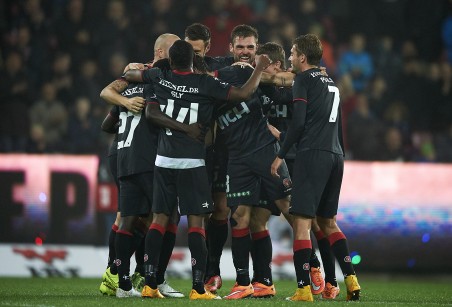
The strategy appears to work grandly, with FC Midtjylland leading the Danish Superliga by nine points over the country’s traditional powerhouse, FC Copenhagen, and scoring almost one goal per game from set pieces—the highest average in Europe per 90 minutes.
Just don’t draw the conclusion that the new Midtjylland are doing well on the basis of those numbers. If you do that, Ankersen will tell you that are ‘rationalising randomness,’ which is his gentle way of calling you stupid.
For one, scoring four times from set pieces in one game—as Midtjylland have done three times this season—is impressive, but ‘not sustainable, because that much success is for a large part down to luck.’ Secondly, the club’s new leadership has solemnly vowed never again to judge their performance on the basis of a measurement as vulgar and imprecise as the league table. ‘In fact, we have a manifesto now,’ Ankersen says, ‘which says that the model rating always, in any case, overrules the league position in evaluating our performance.’
And at this particular moment in the season, as Ankersen puts it, ‘The table is lying.’
‘We have been the best team in the league this season, but nine points ahead is probably not a fair reflection of the difference between us and Copenhagen. The difference is that we got lucky in some games and they got unlucky. This is what I keep telling the coaches: don’t think we’re good just because we lead the league. We’re good when our model says we’re good.’
A bet on science in football
The revolutionary experiment here began last summer, when the English former hedge fund manager and sports bettor Matthew Benham bought a majority stake in the near-bankrupt club. Benham had made a fortune beating the sports bookies through use of statistical analysis.
In 2012 Benham bought Brentford, the League One side he has supported since childhood, and set out to see whether the models that helped him as bettor could work in the actual management of a club. Since his takeover, Brentford have been promoted to the Championship. This season they are still in the contention to win promotion to the Premier League.
But Benham wasn’t done buying clubs. On the advice of Ankersen, whom he had befriended after reading his book on sport talent identification and development, The Gold Mine Effect , Benham bought a majority stake in Midtjylland.
Photo: Hollandse Hoogte
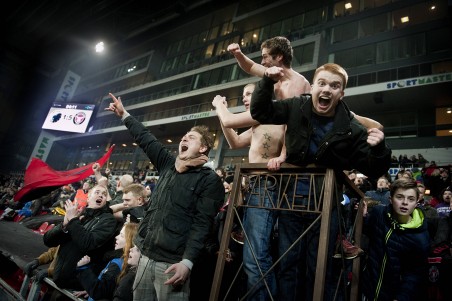
Midtjylland was a club Ankersen knew very well—it was the club that he had played for as a youth player, and that he coached after an injury sustained in his first senior game cut short his career as a player. The club consisted of people, Ankersen told Benham, who would be open to new ways of doing things.
Benham appointed Ankersen as president. The boy-turned-boss had a message for his new underlings: both long-term and short-term decisions would not be made in the way they used to be made. Central to the new way of doing things would be a rating model of European football squads, inspired on Benham’s model, which had allowed him to beat the bookmakers’ odds consistently enough to become rich enough to buy two professional football clubs.
How did Midtjylland’s organization react? ‘A mild shock,’ Ankersen concedes. But as a child of the club, he managed to make the radical change in approach more palatable to the club’s open-minded yet sceptical employees. ‘And of course it also helped that they were running out of money,’ he says smiling. ‘If you’re out of money, you tend to listen to people who want to give you money.’
Nevertheless, the adjustment period is not over quite yet.
‘I need to keep telling the coaches: trust the model. If this way of thinking about football were stupid, then Matthew wouldn’t have been able to buy not only us, but also Brentford.’
Tim Sparv, the no-stats all star
Many of the plans that Benham and Ankersen have for Midtjylland are yet to be implemented. ‘It’s important not to make the shock too sharp,’ Ankersen says. ‘You eat an elephant one bite at a time.’
But the quantitative way of doing things at Midtjylland has already influenced several decisions on and off the field. One of them is the decision to buy the Finnish defensive midfielder Tim Sparv , whose acquisition was based on the rating model’s opinion of his former club.
Ankersen calls Sparv “the no stats all-star.” Sparv doesn’t generate the spectacular numbers usually associated with players in his position, like duels won and balls recovered. But in Sparv’s case, that is a good sign, the new Midtjylland management believe.
‘We have another number 6 [defensive midfielder, MdH], Izzuna, who looks the more impressive player. He is very strong, very athletic, and he makes a lot of spectacular interceptions,’ Ankersen says. ‘Our opponents’ coaches are often in awe of what he does. Sparv seldom gets that credit, but we believe that this is because his positioning is so great. He sees problems before they arise and so he doesn’t need to tackle or run as much as many other central midfielders do.’
Sparv landed on the club’s radar because Midtjylland’s model was bullish on his former club, Greuther Fürth, from Germany’s second tier. ‘Our model says that last season, Greuther Fürth were good enough to play in the English Premier League.’
Ankersen is able to say this because the model Midtjylland use ranks all the clubs in Europe as if they are in one big league. Greuther Fürth didn’t play against the Premier League, but they did play HSV of Hamburg, who in turn played Bayern Munich, who, in the Champions’ League, played Manchester City, who played the rest of the Premier League. Thanks to European club tournaments, the model can cross-reference results from different leagues and use advanced statistical tools to rank every club on the continent.
Photo: Lars Ronbog / Getty Images
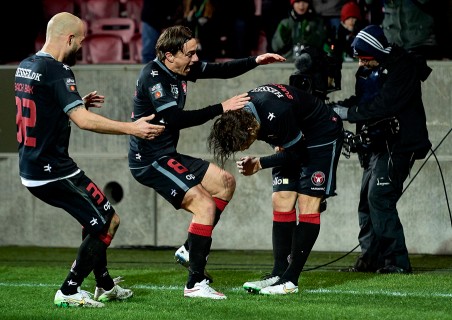
This allows Midtjylland to see through the aura that the Primera Division or Premier League project onto the clubs that play in them. ‘People see huge difference between the Premier League and the lower divisions in England,’ Ankersen explains. ‘We think this is not true. There is a big gap between the Premier League’s number 7 and number 10. But the gap between the Premier League’s number 10 and the Championship, or even League One, is far smaller.’
It also allows them to see the true value of clubs playing in rather less fashionable leagues. So when Greuther Fürth appeared surprisingly high on the ranking of all European football clubs, Midtjylland took an interest in the players who had the most appearances for the club, and were thus most responsible for Fürth playing like a Premier League team. Top of that list: Tim Sparv.
Last week, Ankersen travelled to Spain to meet with a player who is on a team in the Segunda Division. According to the model, however, the club plays like a mid-table team in the Primera Division; i.e. a lot stronger than its real-world position.
‘And I’m not going there to watch him play,’ Ankersen says – this could only muddle his opinion of the player, who he knows is good. ‘It’s to convince him to move to Denmark.’
Possible new rule: scouts cannot watch live games
That’s one of the other mantras at the Danish club: distrust your eyes.
In fact, Midtjylland are questioning how valuable it is for their scouts to travel to live matches to evaluate players. ‘One game doesn’t tell you anything as a scout. If you base your opinion of a player on a few games you’ve attended, it will blur your vision. It’s a small sample. We believe it is more effective to see lots of matches on video.’
Top: Brian Priske, assistent-coach of FC Midtjylland. Bottom: Glen Riddersholm, coach. Photos: Jan Christensen / Getty Images
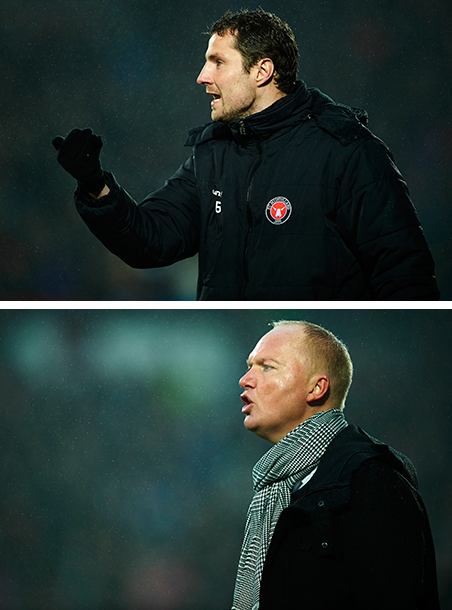
‘The scouts do a different job here,’ Ankersen says. ‘We tell them: your job is not to tell us whether a player is good or not. We already know that. The scouts need to see whether they are a fit from a personal, psychological point of view.’
While the data revolution most radically impacts recruitment, the club will also work very differently with the players who are already at the club. Ankersen and Benham both think that football players in general can train more frequently and effectively than they currently do.
Ankersen cites golf as an example: ‘Golfers practise on their swing every day. So why can’t footballers do that?’ So now two players on Midtjylland’s senior squad are training with a specialised kicking coach.
While the effect of this coaching is not yet clear, Danish football fans have already become aware of another innovation: Midtjylland’s reputation as free kick specialists. Since the Benham/Ankersen takeover, the club’s attention to set pieces are yielding them a lot of cheap goals - as they think set pieces are underexploited by football as a whole.
Set pieces are discussed in training and in a formal monthly meeting, with Ankersen, the coaches, and three players present, and sometimes an outside expert is asked to comment. ‘Last month, we had a former American football player from the NFL sitting in.’
This incentive has a clear effect on the pitch. In Sunday’s match against Esbjerg, assistant coach Brian Priske—who is in charge of set piece routines—stood up from the bench to instruct players every time Midtjylland conceded or won a free kick in the vicinity of the goal, an unusual sight in a sport where usually only the head coach gets up from the bench.
The first free kick routine—involving Tim Sparv running around Esbjerg’s wall as if he were an NFL running back skirting the defensive line—didn’t pay off because the kick was taken badly. The second free kick yielded a goal, with Morten Duncan Rasmussen heading Midtjylland into the lead, and upping his team’s set piece average.
The humans-free football club
Aided by the free kick opener, Midtjylland went on to win 3-0. And five days later, they beat third-placed Randers FC, with a winning 88th-minute set piece goal.
Highlights from Midtjylland’s win against Randers
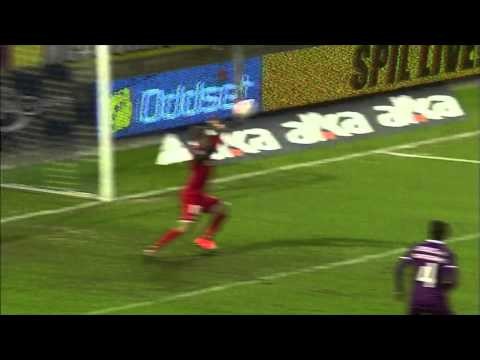
They were now six points closer to the club’s new stated aim to reach the group stage of either the Europa League or the Champions’ League every other year. Combined with smart transfer policy and a better marketing strategy, Midtjylland hope to balance their books soon.
Will the new approach work?
Obviously Ankersen trusts his ideas. ‘But we will also fail, we will make mistakes,’ he says. ‘No model is perfect. But we trust that ours is very good.’ And if they stick to it, Midtjylland expect to make fewer mistakes than other clubs. They can only hope to beat the bigger, richer teams in the country, Ankersen emphasises, by thinking differently from other clubs. Not just a little bit differently, but radically differently.
‘We redesigned the club based on a question: what would a football club look like if it had no human eye and ear? Of course, it turns out you need a human element. But if you say from the start that ‘Oh, it has to be a combination of stats and humans,’ then you won’t be radical enough to be able to make a difference.’
Thanks to Sander IJtsma, who contributed to this article.
 Why notorious klutz Lex Immers is actually one of the nation’s best soccer players. Or was.
He is perhaps the most ridiculed soccer player in the Dutch Eredivisie: Lex Immers, now on loan to Cardiff City in Wales. If we are to believe his many critics, the Feyenoord midfielder can't pass, can't control the ball, and can't finish. All he can do is tackle and run, which the Dutch rank just slightly above turning up for the match on time. Is this reputation deserved? The short answer is no, but it's safe to say Immers will always be better than he looks.
Why notorious klutz Lex Immers is actually one of the nation’s best soccer players. Or was.
He is perhaps the most ridiculed soccer player in the Dutch Eredivisie: Lex Immers, now on loan to Cardiff City in Wales. If we are to believe his many critics, the Feyenoord midfielder can't pass, can't control the ball, and can't finish. All he can do is tackle and run, which the Dutch rank just slightly above turning up for the match on time. Is this reputation deserved? The short answer is no, but it's safe to say Immers will always be better than he looks.
 6 secret traits that make Louis van Gaal the humble genius he is (and mainstream media fail to see)
If you only know Manchester United manager Louis van Gaal from his interviews in mainstream media, you probably think of him as one of the most arrogant and socially inept football coaches in the world. In truth, most of his astonishing successes are due to his humbleness, willingness to adapt and eagerness to learn. On the eve of his first match at Old Trafford, a portrait of a man who is adored by his players as much as he is misunderstood by the public.
6 secret traits that make Louis van Gaal the humble genius he is (and mainstream media fail to see)
If you only know Manchester United manager Louis van Gaal from his interviews in mainstream media, you probably think of him as one of the most arrogant and socially inept football coaches in the world. In truth, most of his astonishing successes are due to his humbleness, willingness to adapt and eagerness to learn. On the eve of his first match at Old Trafford, a portrait of a man who is adored by his players as much as he is misunderstood by the public.



